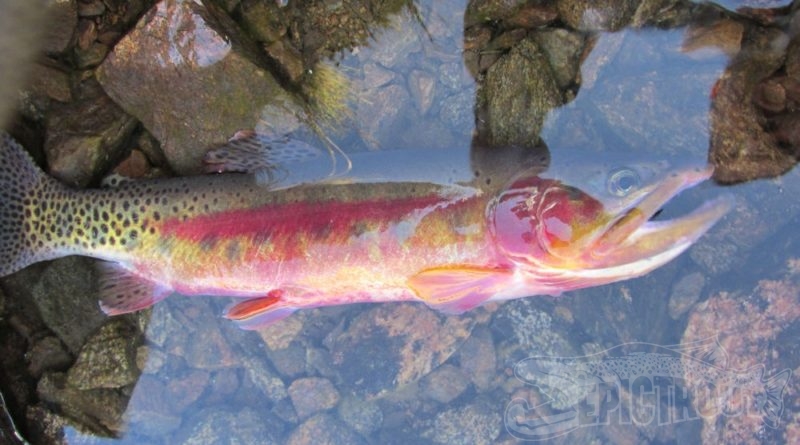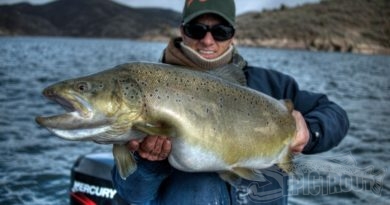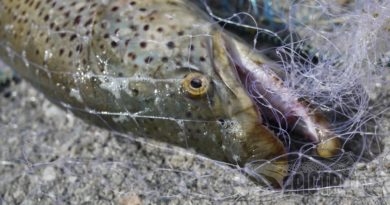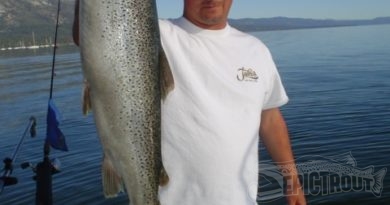Searching for Gold
If you’ve lived any kind of full life, if you’re at all adventurous, you have had at least one moment where you’ve said to yourself:
“What the hell am I doing? I should be home in bed!”
I’ve had more of these times than I care to count, and over the years I’ve learned that unless you actually do just stay home every day, they are inevitable. A person who goes out of the house is more likely to get hit by a bus. The key is not to try and avoid these moments but to know when to listen to your inner mommy, and when to just tell her you’ll be home later. If you’re drunk late at night and find yourself about to engage in a misdemeanor or on the verge of making love to a woman you wouldn’t date in the sober light of day, by all means, heed that nagging inner voice! Go home and go to bed! Without the woman, you knucklehead!
But if you are engaged in a more honorable yet daring activity, say running a marathon, there will be a similar voice, telling you that you are exhausted and you should go home and rest. And that voice is telling the truth as well, but it’s also being a little bitch and needs to shut up.
Last summer my friend Brad Stout and I went on an adventure where that nagging whisper of sensibility was our constant companion, and as we walked the fine line between listening and ignoring, we learned a lot, and had one of the best fishing adventures of our lives!
“20 more trips”. I had said to Brad on one of our outings. We were discussing how much we enjoyed fishing at this particular lake at least annually. I remarked that we were both in our forties, and in relatively good health. But maybe twenty years from now, one or both of us might be too old and decrepit to make the trip.
“This isn’t exactly backpacking.” Brad retorted. “I mean we’re camping in a trailer with heat and electricity. I think I can do that when I’m in my sixties.”
True! That’s what we usually do and the most strenuous tasks we execute are drinking too much beer and getting up early to go fishing in a boat the next morning. But this year our favorite spring time lake was suffering from California’s prolonged drought, and Brad brought up my “20 more trips” comment, then suggested something different.
“Let’s do something we really won’t be able to do in twenty years!” He said. A fishing trip so demanding that we needed to train for it; to physically get in shape, do extensive research and preparation, and purchase specialized equipment. There would be no trailer. There would be no boat. There would be no beer! There would be whiskey though.
Because Brad wanted to catch a golden trout. And when he asked me to help him out I was honored. Here’s the best angler I know, who has taught me techniques for giant browns, mackinaw and cutthroat, requesting my assistance to catch a fish. He had he caught one small golden when he was 18 or 19, and he wanted to lay his eyes on another Oncorhynchus mykiss aguabonita. Even the name is pretty.
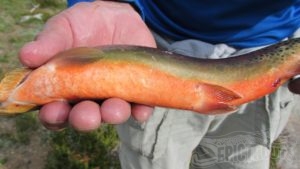
Beautiful belly of a golden
I had never caught a golden trout in my life until the summer before last, when I was fortunate enough to visit a high sierra lake teeming with this species. Another good friend took me on this arduous trek, and though Brad had been poring over maps and write-ups of nearly every golden trout water in California, when I told him about the good fishing for fat goldens I had found he told me he wanted to go to the lake I had visited. And good friend that I am, I asked him if he was really up for the challenge. You see goldens do not generally reside in roadside waters, nor are they common below 8,000 feet in altitude. It takes work to even get to spots that hold these trout, making an overnight stay or even multiple nights camping one of the best ways to undertake a golden trout expedition. And it takes decent backpacking equipment to make the camp-out enjoyable, or at least bearable. On my previous trip to this lake I used my twenty-year old backpacking gear, and suffered. There is equipment on the market now though that weighs half as much as my old stuff, with performance and features that didn’t exist back then. Brad had never been backpacking at all, so we started shopping. Brad happens to work right near REI in Reno, and he began stopping in weekly, trying on shoes and backpacks, wriggling into sleeping bags, and generally making a nuisance of himself.
The knowledgeable staff selected and adjusted backpacks for him specifically for his height and build. Then I just placed an online order for the same pack he chose, since we are roughly the same height and weight. And that was the start of what turned out to be an expensive four-month shopping spree. We would talk every week; me, Brad and our inner voices.
My inner voice asked me what would happen if I gashed my leg on a rock, so I bought a lightweight first aid kit. Brad’s voice talked about bears tearing apart our campsite for food, so he bought a bear canister.
And so it went. As the weeks went by the gear talk turned to fishing equipment. That became quite a conversation, as two supposed experts and absolute hoarders of fishing lures tried to pare down to light backpacking kits. Every pound of unneeded supplies added to the pack at the trailhead will feel like ten pounds on your back by the final mile, I reminded him. He told me not to worry, he was getting in shape!
Now I exercise regularly all year, so for physical preparation I simply increased my hiking and mountain biking mileage, added some longer hill climbs, and hiked with an anchor and some dumbells in my backpack to simulate the weight of my camping gear. Brad promised me that he was also training, but he lives 70 miles from me so we didn’t train together and I had to trust that we was adequately preparing himself for the trip.
Well it turns out that despite his description of hiking up a steep hill near his house wearing a backpack filled with two-liter soda bottles (to each his own), my friend was not prepared, but we still made it and had such an amazing adventure it would take a book to fully describe our three-day trip. Instead I’ll just share some highlights, of things we learned along the way.
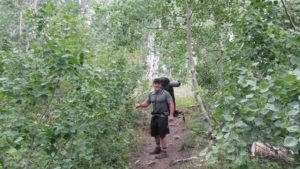
Just before the thunder and lightning
Weather forecasts are merely suggestions. And ten-day forecasts for the high sierra are meaningless. I already knew this but Brad was happily chirping away nearly two weeks before the trip about the bluebird weather we would be having. My inner weather channel called bullshit. It had been a stormy summer. Sure enough, three days out it became clear that there would be a risk of severe thunder showers during our trip. Driving the dirt road to the trailhead, we saw gullies and washouts on the steep terrain indicating torrential rains had just pounded the canyon. Next, I quickly learned that while choosing lightweight hiking boots without Gore-Tex for a midsummer trip made great sense while inside a carpeted store, the rain-soaked grass on the trail soon made me wish I had chosen waterproof footwear. We both brought lightweight rain suits though, and as a light drizzle turned to a downpour, we hid under some trees and put on our waterproof jackets and pants. Just as we did so, dark thunderheads edged over the ridge we were about to climb, spitting lightning and heavy hail. We stayed under the trees, which offered partial protection from hailstones that were large enough to sting if they hit skin. We ate snacks and waited for the sun to break through before getting back on the trail.
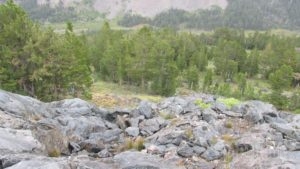
Lost the Trail
You can get lost, even with GPS. We had maps, we had studied Google Earth satellite mapping before the trip, and Brad even had a brand-new backpacking GPS to consult as we went, but still we lost the trail. We weren’t lost as in we had no idea where the lake was or how to get back to the truck, but partway up that last steep wall, we just found ourselves in a cull-de-sac of thick Manzanita bushes with no discernible way forward. The GPS told us the lake was still basically straight ahead of us, and our trail was just a couple hundred feet to our right, but as we headed that way we were stopped by an eighty-foot cliff and a jagged creek-canyon. Part of our confusion is that this area has been used for generations by Basque sheepherders who pasture their sheep in the high country each summer. So at nearly every turn of the main trail, there are two or three similar looking sheep trails that lead off to nowhere, or to places only sheep can go. Sure I had been here once before, two years prior, but I recall we had gotten a little off course on that trip as well. We had taken a sheep trail to nowhere. So we bushwhacked. I led the way, making my own switchbacks up steeper and steeper terrain. The rain started again and our feet slid on the muddy, unstable slope. Here we found that the trekking poles we both brought were no longer a luxury but a necessity, allowing us to keep climbing.
Physical fitness is important, but mental toughness is essential. We eventually found the trail again, but we had added over an hour to our trip, climbing up crazy steep terrain with forty pound packs. Now could see the final ridge we had to climb looming above us, and as we started this last ascent, Brad bonked. Yes that’s a term; ask a backpacker. Also known in long-distance running as “hitting the wall”, when the body physically cannot continue, or so it tries to tell the mind. Here is when we find out what kind of inner voice a person really has. Brad was bonking; I could see it in his face, which was pale with faraway eyes, like a person going into shock. But he did not break down and cry, he did not beg to go home, he did not ask if we could just set up camp by this bush on a steep slope. And I’m sure there was a voice inside telling him that’s what he should do, but my friend is a man of great inner strength, and he instead told the voice that no, he had a plan, which he shared out loud with me as well
.
“I’m going to take 50 steps, then stop and rest. And maybe I’ll puke. Then I’m going to take 50 more steps…” .
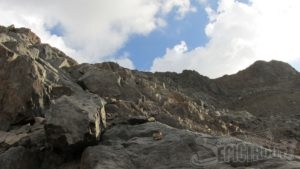
Death march time to go up and over
And that’s what he did, slowly, painfully making his way up the final ascent in 50 step sections. I went ahead but kept him in sight in case he needed help. We both kept our eyes focused only 10 feet ahead of us on the trail, because it was too daunting to look all the way up at the ridge we still had to crest. I put in ear buds and played hard rock with a driving beat from my phone, marching music. I powered up the last few hundred yards then stopped, breathing hard and sweating profusely, just short of the ridge above our destination. I wanted to be there when my buddy saw the lake for the first time.
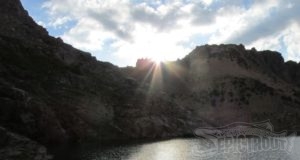
We made it to Heaven
And what a vision it was, an emerald jewel of sparkling water, in a perfectly carved glacial bowl below us. I watched Brad’s pale face and saw color come back into his skin as he smiled broadly at the paradise just down the hill.
On this August afternoon, we encountered no other campers and I led Brad to the best site on the lake to pitch our one-man tents. Though we brought plenty of lightweight, dry backpacking food on our trip, for the first night I humped in two pounds of frozen steaks to replenish our energy. Once we had our camp set up though, we decided the lake just a couple of hundred feet down a steep hill from our campsite was too tempting, and we grabbed our fishing rods and headed down for a few casts before dinner. Brad had been practically incoherent with fatigue when we first arrived, but now with a pack of peanut M&M’s in his belly and fish rising on the calm waters of the lake, he showed a renewed vigor, jumping between shoreline boulders as he made impossibly long casts with his spinning rod. He was throwing lures, while I tried bait fishing with my two spinning rods. The rain had stopped and sunset was breaking through the clouds. On his third cast, Brad hooked a fish on a Panther Martin spinner and soon had it splashing in the shallows at his feet. Now, at this exact moment, everything made sense. The cost, the preparation, effort and blisters. It was all worth it. We were to spend the next two days in the kind of heaven trout fishermen go to when they die. For at least a moment, my inner voice was silent.
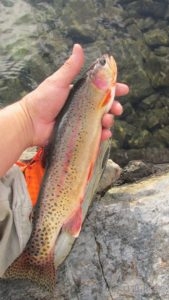
Shoe size Golden
Fishing is My Zen. It really is. Trout fishing is a unique exercise for the mind. To remain endlessly patient and utterly relaxed yet ready for hours on end to react in a split-second at any time. All while paying attention to a thousand little cues and details in order to be successful. This is fishing for me, and it puts me in a zone where I can’t worry about my future or regret my past. My mind is occupied only by the moment I’m in. And in that zone, I find the trout.
Brad lives in that zone at all times I think, and he quickly caught two or three more goldens. I couldn’t believe how far he was casting such a small lure. That little detail was my cue to interrogate him because my friend always has some new fishing trick up his sleeve. And sure enough, he revealed that he was using two-pound-test monofilament! So that’s how he was casting a one-eighth ounce lure so far! And it was clearly effective, I noted as he hooked another fish.
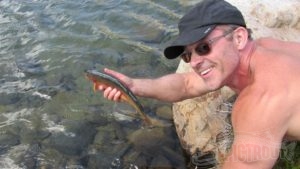
C&R Golden
I had my own trick though, and it began working immediately as well, with fish biting on both my rods. Rods on which I was using a very special dough bait. Having fished dough baits such as Berkeley Power Bait for many years, I’ve found these products to be very effective on hatchery and recent hold-over trout, but wild trout often reject dough baits in favor of natural foods. So over the last few years I have been developing and testing my own floating dough for trout, and I’ve developed a highly effective formula that works much better than Power Bait on wild, backcountry trout. I’m not going to divulge the actual recipe here, but suffice it to say that it involves adding natural scents in varieties that mimic natural food sources for trout.
You Can Suffer In The Backcountry, But You Don’t Have To. We fished until close to dark, catching over a dozen trout, then made our way back to camp where I cooked our steaks on my new ultralight Coleman stove (less than three ounces!) and served them with a broccoli-cheese rice mix. Then we sipped Wild Turkey bourbon as we unrolled our sleeping bags and pads and arranged them in our tents. I chose this liquor because I like bourbon and because at 101 proof it has the high buzz-to-weight ratio I prefer for backpacking trips. And combined with our long day and the altitude, this night cap packed quite a wallop, leaving us ready for bed in short order. Brad opened several of the chemical heat packs popular with skiers and placed them in his sleeping bag for extra warmth, and then strategically placed several Reese’s Peanut Butter Cups within arm’s reach. Yes, as I had learned on our first camping trip together, my friend “sleep-eats”. Some people talk in their sleep, some walk, but Brad eats. And it has to be sweets, some form of candy. And if he doesn’t lay out his snacks before he goes to bed, he will tear apart his surroundings, looking for treats, all while still asleep. “Can you put out a protein bar, or some orange slices?” I asked him once.
“No” he replied, “It has to be junk, nothing good for you.” Then he rummaged around in his pack and brought out a modern backcountry essential, the ultimate backpacking pillow and sleeping pad combined: Ambien. Yes, this prescription sleep aid cushions your brain in a sedative cocoon that helps you ignore the root or rock that you can feel through your sleeping pad and the thousand night-time noises of the backcountry. Yet the effect is light enough that you will still wake up if you need to urinate or a bear is tearing apart your camp. Side effects though can include sleep-walking, talking, eating, and other activities normally relegated to waking hours. Sleep-sex is even listed, and I was thankful that Brad’s nocturnal Ambien activities are limited to the consumption of snack products. I’m not a regular Ambien user, but I took one when he offered, because my sleeping arrangements here were a far cry from my pillow-top mattress at home.
Our tent-openings were facing each other and we discussed life for a while, in a way you would talk only with close friends, in a setting removed from the distractions of modern society. When there are no flashy cars or women going by, you tend to talk about deeper things. Brad opened up about his anger issues, which go back to his relationship with his mother. I talked about how since my divorce I have been dating women who are too young for me, which while fun at the time, is probably not the recipe for long-term happiness. In fact I had told myself that this trip would be a great time to contemplate my life, and come to some decisions about my future. I never really got to this though; the fishing was too good.
I think we were just about to sum up the meaning of life, with Brad making a statement that was particularly profound, or so it seemed through the filter of Wild Turkey and Ambien. But as I was formulating my response I heard gentle snoring coming from his tent, so I closed my eyes and drifted off as well.

